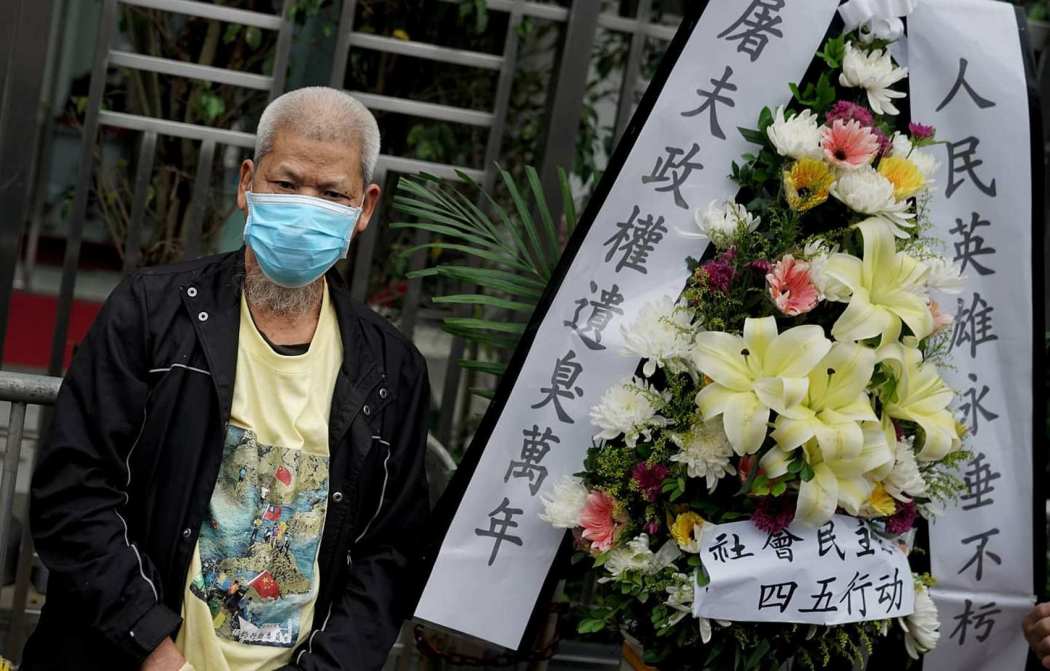Hong Kong veteran activist Koo Sze-yiu has been jailed for nine months for attempting to commit seditious acts in connection with a planned demonstration against the 2022 Winter Olympics in Beijing in February.

Principal Magistrate Peter Law on Tuesday found the pro-democracy activist guilty of breaching the colonial-era sedition law by planning a protest outside China’s liaison office in the city on February 4, when the multi-sport event opened in Beijing. The demonstration was thwarted by police when officers from the National Security Department detained Koo hours before it was set to take place. He was 75 at the time of arrest.
After the conviction was handed down, Koo fired his lawyers, saying that he will give his own mitigation plea.
Koo, who has stage four cancer, told the police that he had prepared a prop coffin covered in slogans such as “democracy and human rights are above the Winter Olympics.” He also called the Beijing-imposed security law an “evil” piece of legislation, and wrote the slogan “End one party dictatorship” on some fabric, a phrase the the government said amounted to “subverting state power” last October.
‘The coffin also added insult’
The principal magistrate ruled that the offence Koo committed amounted to endangering national security, saying that the phrases he painted on the prop coffin and fabric were not “pure criticism,” but had an ultimate purpose of changing or even overthrowing China’s constitutional position.

The line that Koo wrote to mock the national security law also “undoubtedly weakened people’s confidence in the judicial administration,” Law said. He added that, although Hong Kong returned to stability following “large-scale collective unlawful events” in recent years, people’s emotions had not “stabilised” yet. He said Koo’s planned demonstration could trigger discontent against the central and Hong Kong governments again.
The principal magistrate also pointed to the timing of the offence, as Koo scheduled his demonstration around the opening of the 2022 winter games. Law said Beijing was facing “broad criticism” overseas at the time, with some boycott calls. While Koo was not directly linked to the individuals or groups opposing China, his planned protest would “build up momentum” and “echo” such criticism, Law ruled.
Law described Koo as a “veteran protester” and said he had spent money and effort on preparing for the protest. Koo “really looked forward to disseminating his messages” and “hoped some people would join in,” he said. “The coffin also added insult, while the press invitation showed [Koo] wanted to spread his message through the media,” Law said, adding that, by the time police made the arrest, “everything was already in place.”
The court ruled that the prosecution did not have to prove an element of violence in the sedition offence. Law said people may have resorted to violence when committing sedition in the past, but with recent technological advancements, violence was not always a factor, Law said.

He also rejected an argument from the defence claiming that the sedition law was unconstitutional, saying the legislation helped protect national security and safeguard public order, striking a “reasonable balance” in bringing benefits to society.
During his mitigation, Koo accused the Chinese authorities of “wiping out” democracy and freedom and said they had “eradicated” dissidents since the national security law was enacted. In response, Law warned him not to make any political statements and “politicise” the court: “Otherwise it will become very frightening… there will not be judicial independence.”
Koo went on to say that he did not mind becoming a “fighter” for democracy and freedom. Even though he was facing jail time, it was “nothing” compared to the contributions made by Chinese dissidents: “I am unrepentant… [the court] does not need to have mercy on me. Spending time in prison is part of my life, the more time you spend in prison, the smarter you get,” Koo said.
In handing down the nine-month jail term, Law said he reviewed Koo’s background and mitigation. The views expressed by Koo were his personal opinion only, Law said, and would not be a factor in mitigation. He added that Koo was already experiencing health problems when he committed the offence, therefore the court would not consider reducing his sentence based on such a reason.
Sedition law
Koo had pleaded not guilty to the charge and was held in custody for more than five months since being denied bail on national security grounds.

Koo’s counsel and barrister Chris Ng argued on Monday that the sedition law – part of the Crimes Ordinance which was last amended in the 1970s – was not compatible with the city’s Basic Law and the Hong Kong Bill of Rights Ordinance.
It is different from the national security law enacted in June 2020, which targets secession, subversion, collusion with foreign forces and terrorist acts and mandates up to life imprisonment. Those convicted under the sedition law face a less serious maximum penalty of two years in prison.
The prosecution had revealed that the activist had a total of 14 convictions, but it was the first time Koo was found guilty under the recently-resurrected sedition law. His last imprisonment was in last April when he was sentenced to five months for taking part in an unauthorised assembly. He finished serving his jail term last July.
The International Olympic Committee has not responded to HKFP’s repeated enquiries about the case.
Support HKFP | Policies & Ethics | Error/typo? | Contact Us | Newsletter | Transparency & Annual Report | Apps
Help safeguard press freedom & keep HKFP free for all readers by supporting our team
























